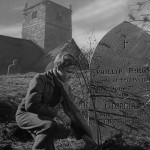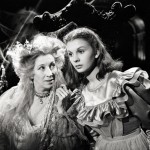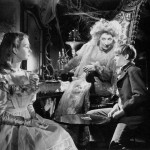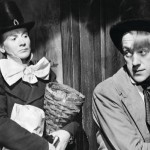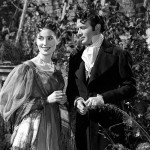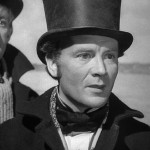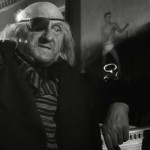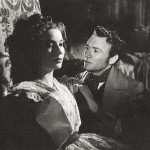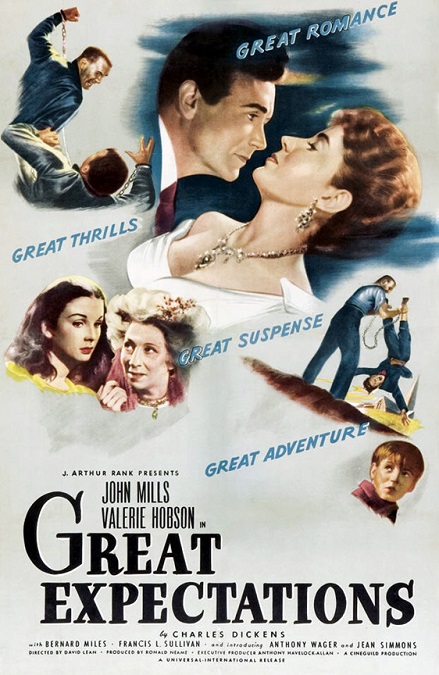
Great Expectations – 1947
Goodness gracious! Charles Dickens is a one-trick pony! If I see one more film based on a Dickens novel in which a young boy, usually a poor orphan, is raised by cruel and harsh people, is sent somewhere where he finds great fortune and a pretty girl around his own age, grows up, becomes a gentleman, has a life of big drama, and eventually finds happiness with the girl, who he has never stopped loving, I’m going to scream!
And there you have it, ladies and gentlemen. That is the plot of Great Expectations, in a nutshell. It is also the plot of Oliver Twist, David Copperfield, and Nicholas Nickleby. Only the names have been changed to pretend that the stories are different. True, Dickens has also turned out some unique novels like A Tale of Two Cities and A Christmas Carol. But I’ll even go a step further than that, and admit that those are about all of his many works that I am familiar with. Maybe there are more unique Dickens novels of which I am not aware.
But I am here to review the film, not the book. The movie was made well enough; the actors did a good job, the music was fine, and from what my research has told me, the script was true to the source material, which I appreciate. In the opening scene, as young Pip, played by Anthony Wager, is visiting his mother’s grave on a foggy evening, he is accosted by the dangerous escaped convict, Abel Magwitch, played by Finlay Currie, who forces him to promise to retrieve food and a file to remove his shackles. The promise is made, and Pip is too honest to break his word, even if it was given under duress.
Later, he is roughly forced to go to the local crazy lady’s house to play for her – not with her but for her. Her name is Miss Havisham, played by Martita Hunt. Many years previous, she was unlucky enough to be jilted on her wedding day, causing her to lose her sanity. She spent the rest of her life in the banquet hall as it decayed in to a filthy ruin. Creepy!
While there, Pip meets Estella, played by Jean Simmons, an adopted girl who Miss Havisham has taught to be cruel to all men. She treats Pip like a bug, but occasionally shows him a wisp of kindness. Of course, Pip falls hopelessly in love with her anyway. Then, after a few years, from out of nowhere, a mysterious benefactor sends lawyer, Mr. Jaggers, played very well by Frances L Sullivan, to take the teenage boy to London. There, he gives Pip a healthy allowance and charges him the task of becoming a proper gentleman.
A few more years go by and he is reacquainted with a grown-up Estella, played by Valerie Hobson. The only character I have not mentioned is Pip’s best friend, Herbert Pocket, played by Alec Guiness. He doesn’t really have much to do with the plot, except that he helps Pip with his difficulties in the latter half of the film.
Unfortunately, there was very little about the plot that was unexpected, and I’ve already spent too much time on it, in any case. Instead, I’ll go over the things about the film that stood out to me as good.
First, I’ll mention the costumes. It was a period piece, so costumes from the 1850s were called for. They seemed to get everything right, though there was one thing that looked out of place. When Pip first arrives in London, he is dress in a gentleman’s clothing with a huge, stiff, white bow at his neck that was as big as his head. Sure the director wanted him to visually stand out on the screen, but it looked ridiculous.
Second, I’ll examine the performance of Martita Hunt. She played the spooky Miss Havisham well. The slow and ethereal speech patterns, the languid movements, and the barely disguised misandry (the hatred of the male gender) all added up to make an interesting, if not likable, character. Hunt did a good job, making the insanity almost believable. The crazy hair and the tattered wedding gown, helped to complete the look of one who has lost touch with reality. Also, her tragic demise took me by surprise. As Pip angrily leaves her room, a stray coal from the fireplace sets her on fire. She begins screaming and ignites like a Roman candle. Pretty horrific, actually.
And lastly, I’ll mention the exceptional performance of Francis Sullivan. The role of the lawyer is actually one that I wouldn’t expect to be memorable, but Sullivan brought both pomposity and kind, discerning morals to the character at the appropriate times. He did a good job, using expressive, but not over-exaggerated, facial expressions to convey his dialogue, making him interesting to watch.
I suppose the film was made well enough, but I just wasn’t impressed with the source material. I don’t get why the literary world is so impressed with Dicken’s rehashing of the same story over and over again. Well, at least it was only a nominee and not a winner.
